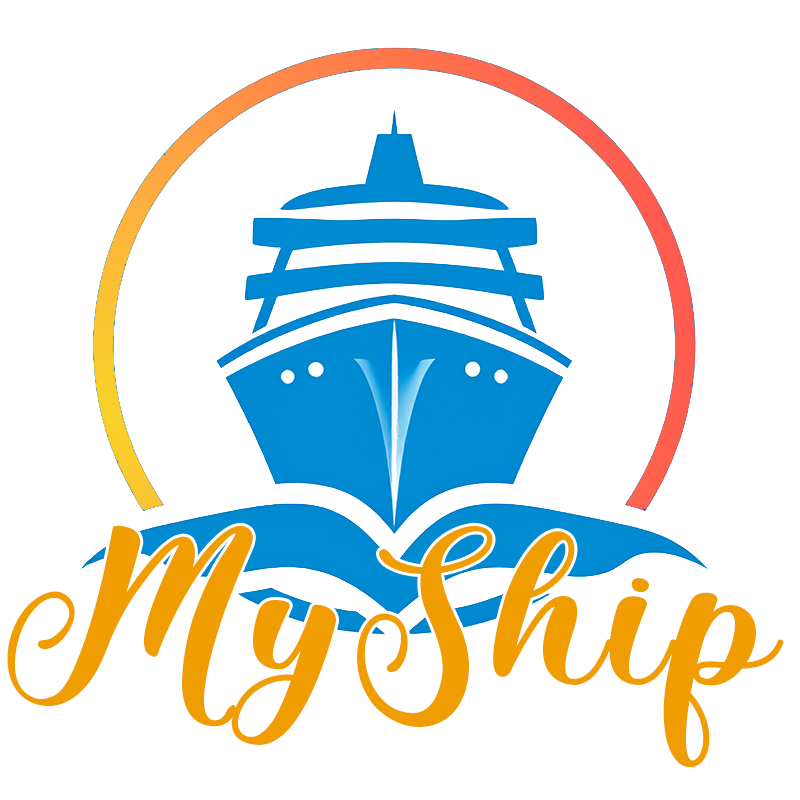Previously… In a storm-lashed night, Captain Silas Blackthorne and the crew of the Crimson Horizon overran a Spanish galleon and seized an iron-bound chest with a serpent-shaped lock. Young Finn O’Malley survived his first boarding by a whisker, saved by Bosun Briggs and a lucky powder keg. When the sea fell quiet, the chest began to whisper.
⚓ The Red Wake
Dawn came stale and breathless, the sea laid out like bruised glass. The Crimson Horizon creaked in the hush, sails slack, rigging ticking as if the ship kept time with its own heartbeat. The iron-bound chest sat in the shadow of the mainmast, a square of night in the morning light.
Silas stood over it, the scar on his hand silver in the pallor. Finn hovered a pace behind, still wearing someone else’s coat and the wide eyes of a boy who’d seen too much.
“Bosun,” Silas said, without looking away from the lock. “Tell me again what you heard on the galleon.”
Briggs, broad as a bulkhead and twice as stubborn, spat to leeward. “Priest in a blue coat called it La Caja de San Telmo. Said no sea takes a ship that bears it—unless the ship bleeds first.”
He nudged the serpent lock with a callused toe. The little steel coils were etched with tiny letters that shifted when Finn tried to read them.
“San Telmo’s light,” Finn muttered. “Sailors’ saint.”
“Aye,” Silas said. “The Spaniards love their saints. And their secrets.”
The captain’s black eye—a milky glass set in a puckered socket—gleamed like it could see anyway. He produced a key taken from the galleon’s dead captain: a tooth of dark crystal bound in brass. He set it in the lock. The serpent’s steel scales drank the light and shivered.
The chest whispered.
Finn didn’t understand the tongue, but meaning slid behind his eyes: depth and direction, a lighthouse that shouldn’t exist, and a map that was not a place but a time.
“Cap’n.” Briggs’s voice had lost all its bluster. “Don’t.”
Silas removed the key. The whisper thinned, like a tide pulling away. He tucked the thing into his coat. “Not here,” he said. “Not yet.”
As if in answer, a wind found them—thin as thread, smelling of salt and iron—and the Crimson Horizon leaned into it. On the far rim of the world, a lantern pricked the daylight, faint as a star.
“Lantern on the chart?” Silas asked the helmsman.
“No lantern on any chart I know,” the helmsman said.
“Then we’re looking at a liar or a miracle.” Silas’s mouth crooked. “Either way, it’s ours. Set a course.”
🐍 Hands to the Chest
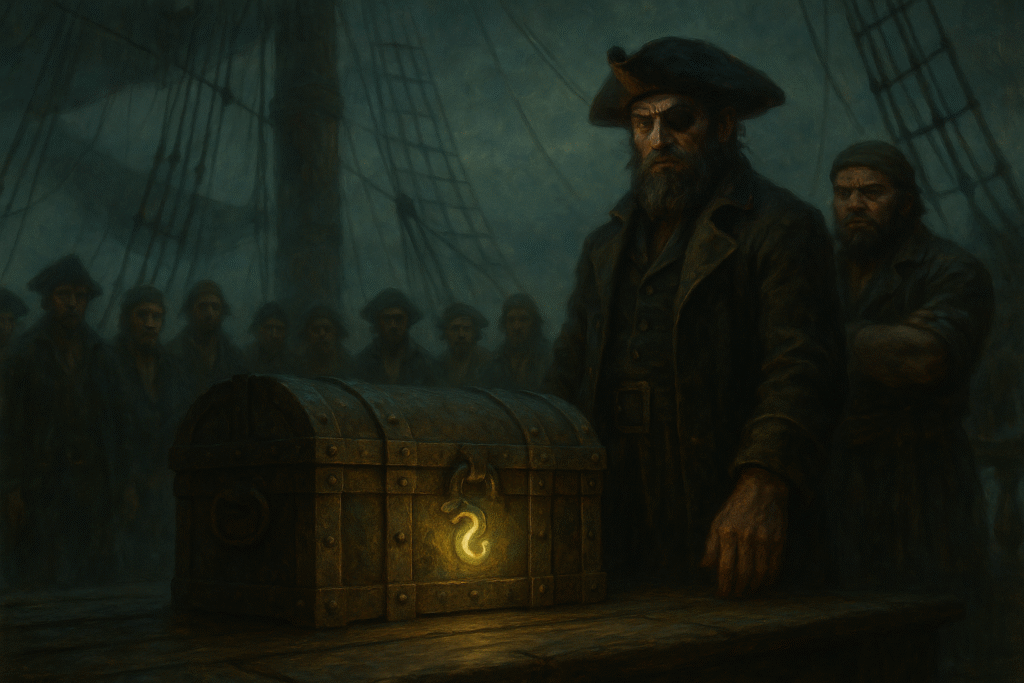
They reached it at dusk: a black lighthouse planted on a reef that no chart admitted existed, its stone wet like it had been poured yesterday. The light in its crown wasn’t flame. It was a red bead that brightened and dimmed, a heartbeat against the falling night.
They hove to in the lee. The sea there was a slick of oil. Shadows moved under it—slow, deliberate. Fish, Finn told himself. Not hands.
Silas had the chest moved to the quarterdeck. Crew gathered in rings that did not wish to be rings, everyone careful not to be the nearest.
“Open it,” someone said. No one owned the voice.
Briggs folded his arms. “We open nothing without knowing what we beg to come out.”
Silas nodded once. He looked at Finn. “Come here.”
Finn’s legs worked without asking permission. Silas took the boy’s hand and turned the palm up. Faint, like ink drawn under skin, a set of hair-thin lines glowed. When the lighthouse’s red blink brightened, the lines brightened to match.
Finn swallowed. “It wasn’t there yesterday.”
“Was,” Briggs said. “Only sleeping.”
Silas held Finn’s palm over the lock. The serpent scales shifted toward the heat of the skin. The whisper rose, not with sound but with pressure, like the weight of a depth above a diver. Finn’s mouth went dry. Under his skin, the lines moved—no, aligned, as if the bones of his hand were a compass.
“Key,” Silas said.
Briggs made a low noise in his throat but handed it over.
Silas set the crystal tooth in the lock. It turned like a thing that had been waiting a very long time for exactly this moment.
The chest did not open.
Instead, the serpent’s head snapped backward as if tasting air, and a thin scarlet thread unspooled from the seam, hovering in the night like smoke.
It drifted toward Finn.
Briggs drew him back. The thread followed.
“The boy,” someone whispered. “It wants the boy.”
Silas closed his hand around the thread. He hissed through his teeth, but the thread stayed caught, a sting buried in his palm. He nodded to Briggs. “Shut it.”
Briggs twisted the key. The thread snapped back, vanishing into the seam with a little sigh. The serpent’s head drooped like a tired hound.
Silas shook his hand; a bead of blood formed in the web of his fingers.
“It wants a tithe,” he said. “Blood for passage.”
Finn licked his lips. “Passage to where?”
Silas looked out at the not-on-any-chart lighthouse. “To where maps are written in tides.”
☠️ Rumors of a Mutiny
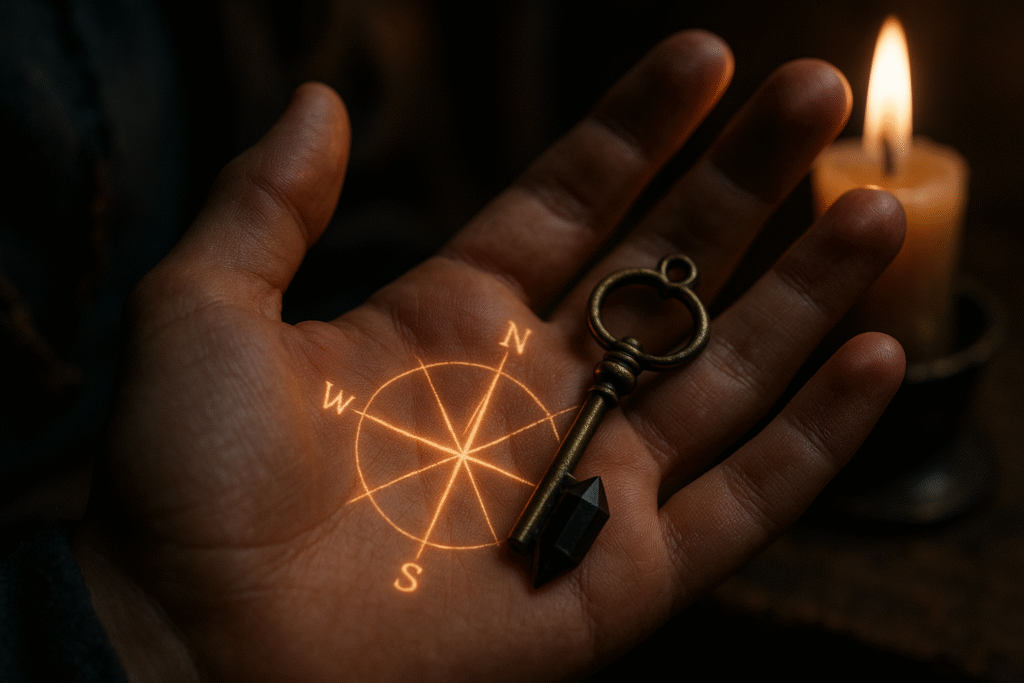
They watered at a crescent of sand the next morning, a spit of beach littered with driftwood and the bones of ships. A hammock town of fishermen had been there once. Now it was boards with stories carved into them.
While the crew scavenged, Finn stood ankle-deep in water that bit cold, the lighthouse winking red in the daylight mist. He rubbed his palm. The lines were brighter now, resolved into a shape like a rose compass with too many petals.
“Hold it to the water,” a voice said.
A woman in a patched coat had come up beside him. Her hair was braided to the small of her back and tied with copper wire. He had seen her in the melee but not learned her name.
“Wh—why?”
“Because it’s telling you to,” she said, as if that was reason enough. “I’m Mireya, quartermaster, when the captain lets me be. I count powder, rum, and debts.”
Finn crouched and lowered his hand. The sea climbed to meet it—no wave, just up. The lines brightened, and for a breath the water showed him a pattern like wind in grass: channels braided through a reef, some fat, some hair-thin. The lighthouse sat at the center like an eye.
Finn rocked back. “I saw a way through.”
“You and the chest agree, then.” Mireya glanced to where the iron-bound thing sat under a tarpaulin, sulking. “Briggs wants it over the side. Half the crew do.”
“Half the crew always want something stupid,” Briggs said, appearing the way big men do when you talk about them. “We’ll not feed a saint’s relic to fish.”
“Relic?” Mireya’s mouth tilted. “You suddenly pious?”
“I’m suddenly alive,” Briggs said, “and keen to remain so.”
She nodded toward the Crimson Horizon. “Then you’ll want to hear the other bit: sail on the horizon, black and gold. The Santa Lucía. She’s hunting us.”
“Spanish frigate,” Finn said, his stomach going hollow. “They’ll want their chest back.”
“They’ll want us,” Mireya said. “The chest is only an excuse.”
Briggs blew out a breath. “Then we’ll take our excuse and go.”
🌫 The Widow’s Lantern
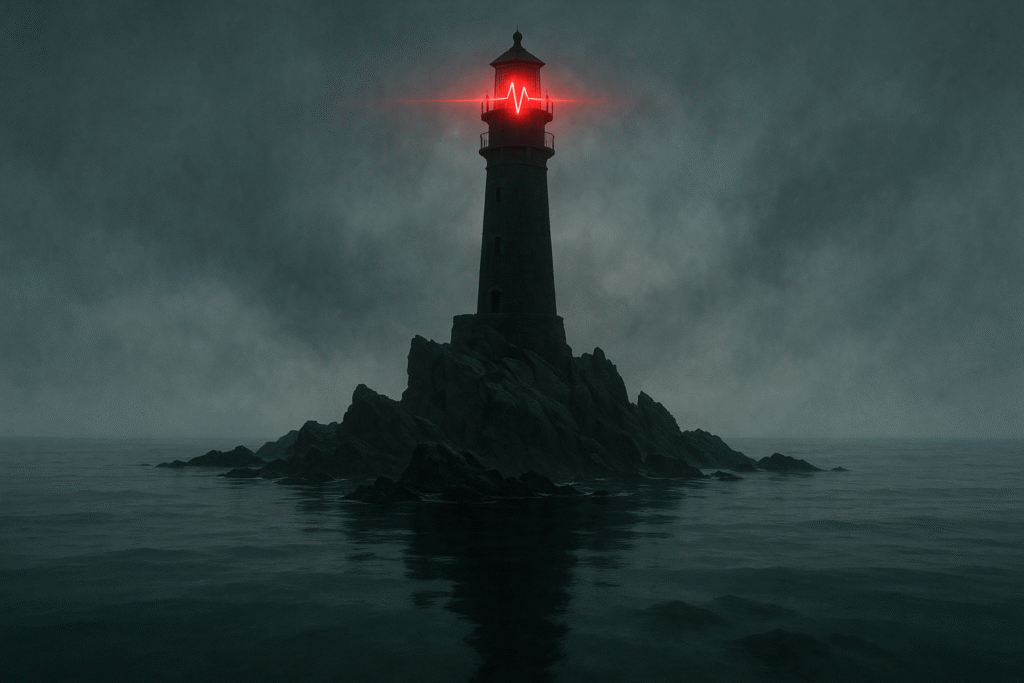
They slipped their moorings in a tide that pretended to be still. The Santa Lucía’s silhouette sharpened astern, taller masts, more guns, the polished posture of a ship that killed for a living and prayed about it after.
Silas climbed the quarterdeck and did not raise a spyglass. He didn’t need to look at a wolf to know it was a wolf.
“Mr. Hayes,” he told the helmsman, “bring us toward the Lantern. Dead slow.”
“Aye.”
The closer they came, the more the lighthouse felt like an idea instead of a thing. The stone was too smooth. The red light had no smoke to it. And yet the reef around it was very real—teeth of basalt, slick with weed, waiting for a hull to split.
“Show me your hand,” Silas told Finn.
Finn held it up. The lines on his palm shifted like a school of fish, then settled with one long line pointing over the bow, slightly to starboard. He moved his hand; the line held true.
“Steer by the boy,” Silas said.
Briggs barked a laugh that would have sounded braver if it had not been ragged. “Steer by the whelp’s bones? Why not.”
They crept. The water changed color under them—not a change of depth, Finn thought, but a change of mood. A ridge of rock slid under the keel like a back arching. The Crimson Horizon sighed. The Santa Lucía followed, not cautious at all.
They threaded the first channel. Finn’s finger curled without his leave, and Hayes eased the wheel. A rock the size of a house ghosted by to port, barnacles glittering like stars. Another wall rose to starboard. The red light blinked to their pulse.
“Captain,” Mireya said softly. “This is a snare.”
“Every safe channel is a snare,” Silas said. “You only notice when it’s not yours.”
The Santa Lucía came up hard, guns opening their mouths. The first broadside boomed, smoke rolling over the reef, but the shots fell short or hissed away into water that seemed to reach up and catch them. The frigate’s captain—stupid or brave—drove her closer.
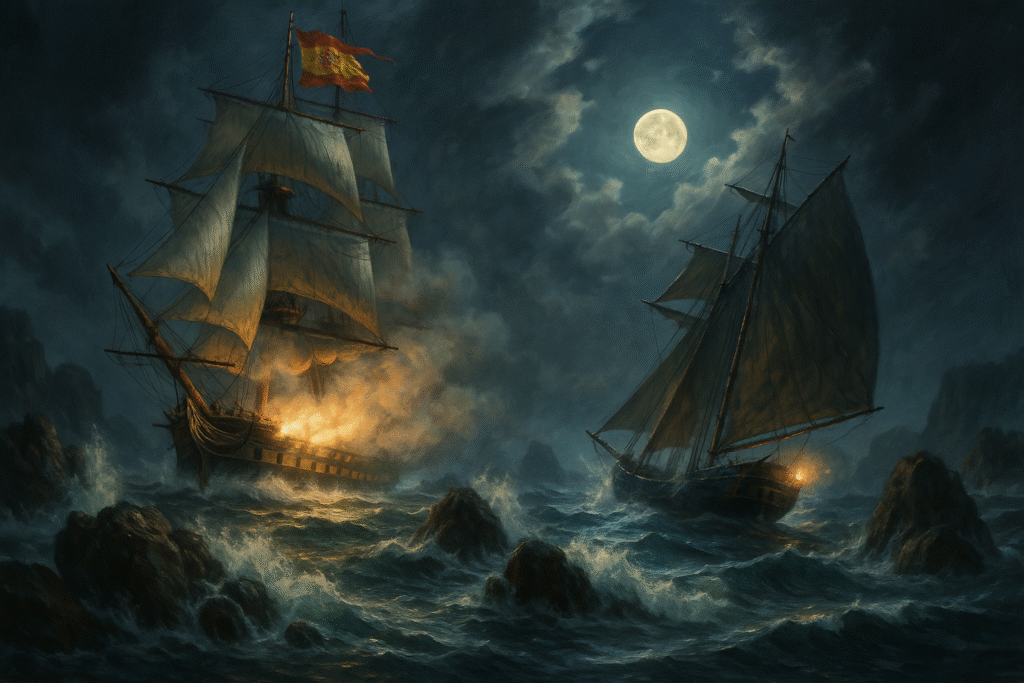
“Hold your course,” Silas said. “Hold the boy steady.”
Finn held as steady as a fourteen-year-old whose hand had become a compass could hold. His palm burned, not with heat but with the sense that he held a thread strained close to breaking.
The channel kinked left. Hayes obeyed. The Santa Lucía followed and, for a heartbeat, looked very fine in the red light, a queen at a ball.
Then her keel kissed something that did not move.
The sound came through water and bone: a long, hideous groan. The frigate lurched. Her masts canted. A wave rolled with intent and set her harder on the teeth. Gunports took water. Men scrambled. Another wave shouldered in, gentler than the first, like a mother smoothing a child’s hair. The frigate settled as if she had always meant to sit there.
Silas’s mouth made a line. He took off his hat.
Finn swallowed. He had not fired a pistol. He had not swung a blade. But he felt complicit anyway, and the chest at his back felt heavier than iron.
“Channel’s ours,” Hayes said hoarsely.
“For now,” Silas said. He put his hat on. “Take us through.”
🗝 The Heart of the Lock
They cleared the reef as the sun sank and the Lantern’s red blink faded to nothing. The sea opened in front of them, a wide black page. Stars pricked it.
Silas set the chest in his cabin and barred the door. Finn and Briggs came in after. Mireya leaned on the doorframe, arms folded, like she would lean on a gallows and make it look comfortable.
Silas unwrapped his hand. The cut from the serpent’s thread had scabbed, neat as a seam. He breathed once, twice, and opened it with a thumbnail. A bead of blood welled, red as the vanished light.
He pressed it to the seam of the chest.
This time the lock did not take a thread. It took the drop, drank it, and gave a small, satisfied click. The serpent’s head slid aside.
Silas fitted the crystal key. It turned without resistance. The chest opened as if it had always been ajar and simply needed someone to notice.
Inside was no gold. No jewels. Instead: a disc of hammered brass the size of a dinner plate, mounted on gimbals, its face a maze of shallow channels filled with mercury that did not slosh. Around the rim, little pointers of bone and jet. The thing was beautiful the way a storm is beautiful: you admired it because you couldn’t stop it.
“What is it?” Finn breathed.
Silas smiled like a man meeting an old rumor and finding it had teeth. “A star-compass,” he said. “Not for pointing north. For pointing when.”
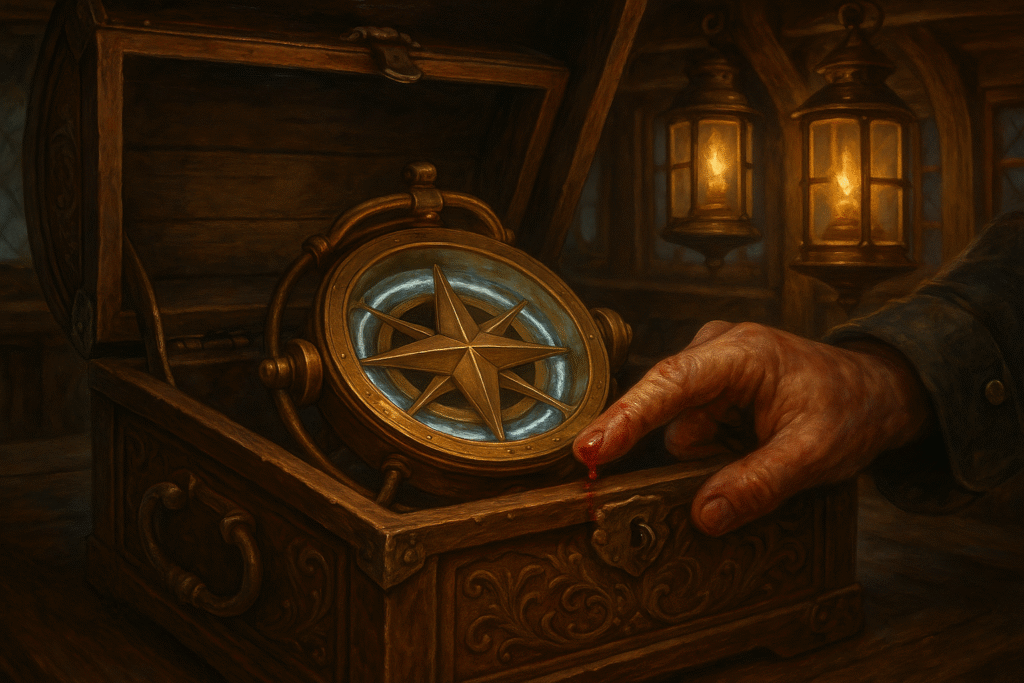
He blew across the disc. The mercury stirred, and the little pointers twitched, clicking against teeth you could not see. Then the mercury drew itself into lines that matched the constellations outside the window—not quite our sky but a sky you could steer if you were arrogant enough to think time had channels like reefs.
Finn’s palm prickled. The lines there matched the ones in the mercury. For a heartbeat his skin and the disc were maps of each other.
Mireya’s voice was very soft. “What passage costs that much blood?”
Silas looked up at the stars. “The kind you can’t buy. The kind you have to owe.”
Briggs blew out a breath through his nose. “And where does it owe us?”
Silas touched a pointer. It sprang under his fingertip and settled with a tidy sound. The mercury’s lines flowed, congealed, and a tiny glow bled up through the brass where no lamp shone. It made a word written in letters older than Spanish or English, and yet Finn read it, the way you read a warning carved deep.
Isla de Sombras.
“Island of Shadows,” Finn said, and did not like how the words felt in his mouth.
Silas nodded. “A harbor,” he said. “Or a vault. Or a grave. Tomorrow we’ll find out which.”
He closed the chest and turned the key. The serpent folded itself back into watchfulness.
“Sleep,” he told them, and made it sound like an order you could obey.
Finn lay in his hammock that night and did not sleep. He watched the stars through the hatchway and thought of channels you couldn’t see but could still wreck you. Somewhere behind the ribs of the ship, the chest breathed with the ship, ticked with it, whispered to it.
When sleep came it carried him to a shore of black sand where the surf ran backward. A woman stood there with a lantern that burned blue, not red. She was as tall as a masthead and had hair like coils of rope.
“Little compass,” she said to him, and her voice sounded like tide in a cave. “Bring me back what they stole.”
“What did they steal?” Finn asked.
She smiled without kindness. “Time,” she said. “And the price of it.”
He woke with his hand burning and the word Sombras on his tongue.
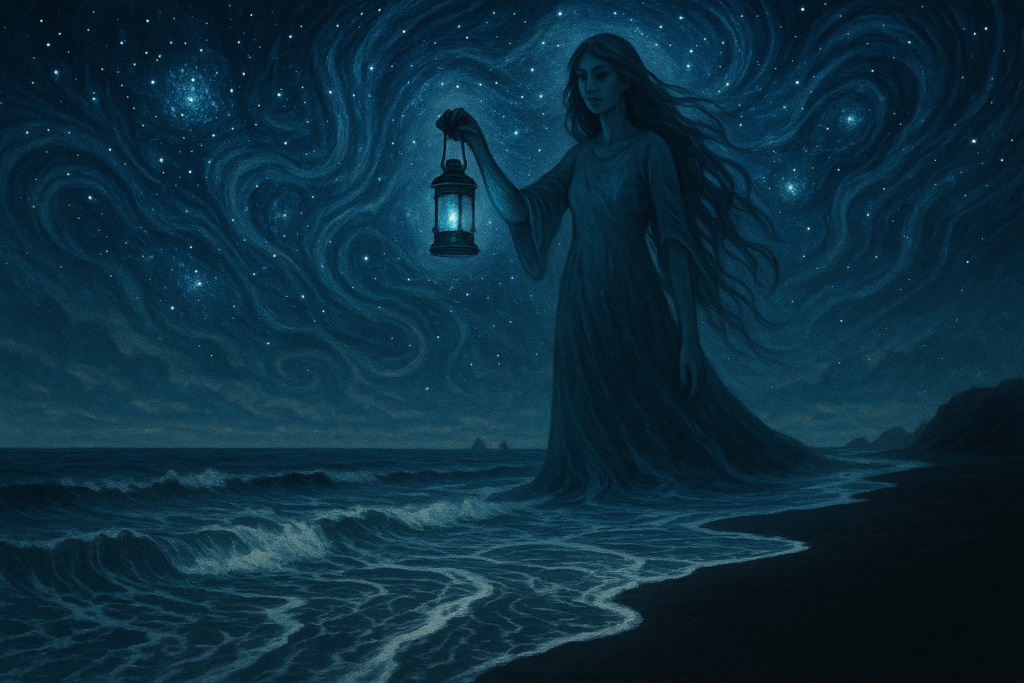
⚓ Next Tide
Before dawn, the Crimson Horizon turned her prow toward a place no chart admitted. The star-compass drank the sky and gave it back as instruction. Finn stood at the rail with Briggs at his shoulder and Mireya on the ladder, and the captain at the wheel with the weight of decisions in his good hand.
The wind came from nowhere, clean and mean. The ship leaned. The sea took them.
“Hold fast,” Silas called to the crew.
Finn closed his fingers around the rail. The lines in his palm glowed like a promise and a threat.
They sailed toward the Island of Shadows.
—To be continued—
